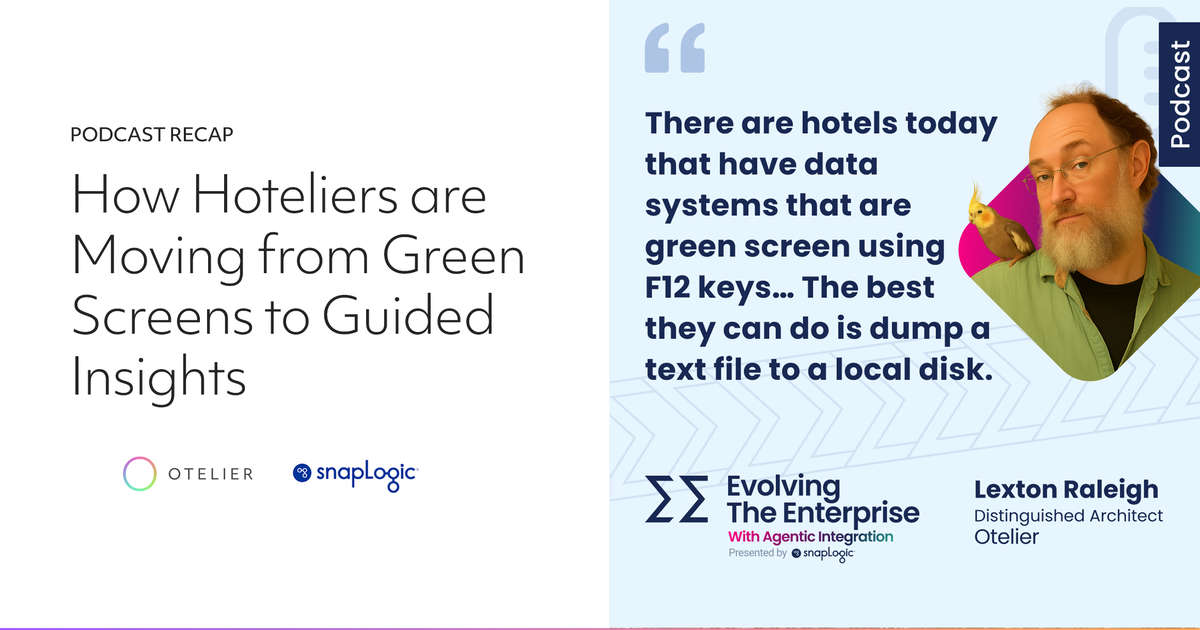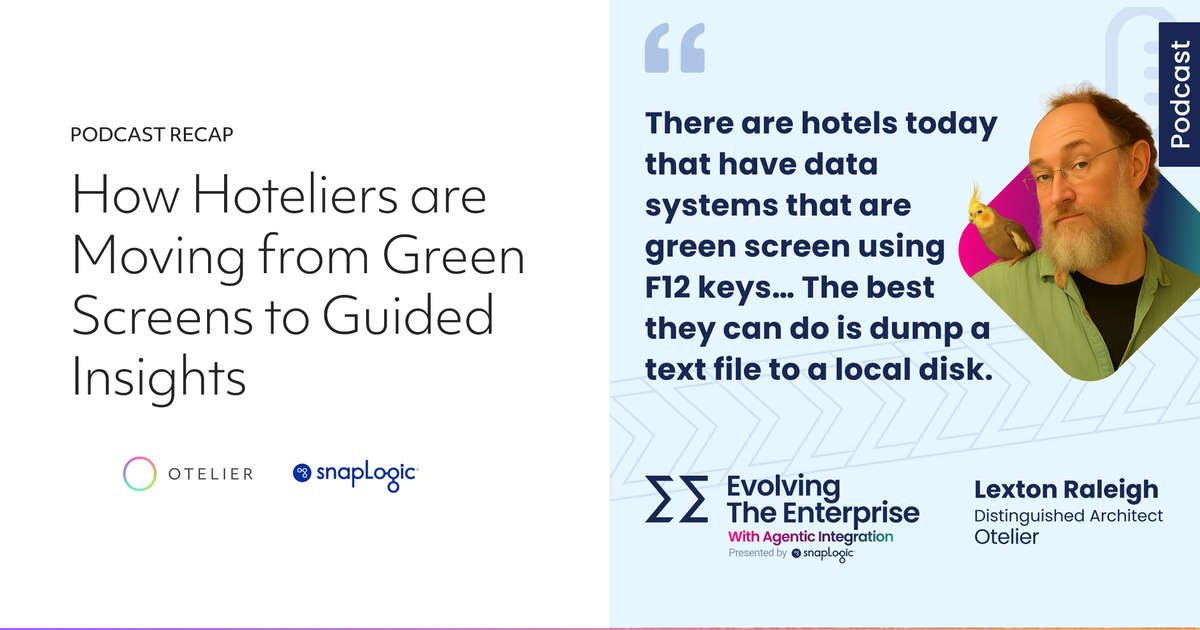
Hotel tech looks simple from the lobby; but as we know, behind the front desk it’s anything but. Recently, Otelier’s Distinguished Architect Lex Raleigh sat down with SnapLogic CMO Dayle Hall to explain why hospitality’s data problem is unlike any other – and how progressive hoteliers are solving it with a mix of pragmatic integrations. Below is a recap of the conversation focused on how innovative hoteliers have already turned to automation, including AI that actually answers questions to help you drive real-life demand.
️ Listen to the full podcast episode.
Why Hotel Data is Uniquely Difficult
Most properties run somewhere between 6–20 operational systems. Now zoom out: a single management company may run dozens or hundreds of hotels across multiple brands, each brand dictating part (but not all) of the stack. Owners often employ multiple management companies; management companies often serve multiple ownership groups; and hotels are bought and sold on 2–5-year cycles. In the episode, Lex says the result is a constantly shifting web of data rights, file formats, and reporting requirements that must be unified – and selectively re-segmented – by audience, without violating governance.
Add in the realities on the ground: many mid-market managers have little to no centralized IT; some properties still rely on green-screen systems with no APIs, no scheduled emails, and “export” that means a text file on a local disk. Integrations must meet each system where it is, from modern cloud APIs to virtual-printer captures – because hotels can’t shut down to replatform. Rooms are perishable inventory: yesterday’s unsold room cannot be sold today. Any change has to run in parallel.
Lex says that while brands and owners care deeply about data, the most acute pain sits with management companies – specifically accounting/finance, sales/catering, revenue, and operations. They’re responsible for daily reporting, compliance, staffing, and guest satisfaction, yet their data lives in silos. Without consolidation, a general manager spends precious time chasing numbers instead of coaching the team or greeting guests.
Start Where Value is Obvious
Raleigh recommends beginning with the business goal, not the buzzword. At Otelier, he says that typically maps to three pillars:
- Operations automation (e.g., night audit workflows, daily revenue reconciliation, labor optimization)
- Business intelligence (portfolio-level analytics, forward-looking pickup, exception monitoring)
- Financial planning (budgeting/forecasting and variance analysis)
Pick the pillar that solves the most visible pain, then expand once data is centralized. Here are three repeatable use cases:
- Daily revenue reconciliation: After the PMS “closes the day,” cash/credit card totals and folio activity should reconcile against expectations. Many hotels still wait for month-end, which hides leakage. One client discovered thousands of dollars per day weren’t settling – not theft, but a disconnected card terminal. Daily automation recovered cash immediately and reduced risk going forward.
- Digital audit packs: Digitizing the audit pack – collecting artifacts automatically, routing for signatures, and storing centrally – saves labor, reduces storage costs, and enables remote audits (a lifesaver when travel is constrained).
- OTA commission reconciliation with ML assist: Third-party statements don’t always match reality. Compare OTA invoices to PMS stays using software that auto-matches what’s exact, and uses machine learning to suggest inconsistencies a human can accept or reject – training the model over time. The outcome: avoided overpayments, faster month close, and fewer tedious hours in spreadsheets.
Where AI is Already Useful, and Where it’s Going
The next major leap for hospitality technology is natural-language business intelligence – analytics that you can converse with. Instead of opening dashboards, exporting spreadsheets, and manually slicing data, hotel leaders will simply ask questions in plain language and receive clear, actionable answers.
Imagine logging in each morning and being greeted with: “Here are the three things you need to know today, why they happened, and what to do next.”
The answers will of course be unique to the user, such as a GM, a revenue manager, a director of F&B, an asset manager, or ownership.
Beyond these push insights, natural-language BI also allows stakeholders to query data directly – no report builders required.
As Lex explains, this evolution shifts analytics from a reactive reporting function to a proactive decision engine. It saves hours of manual analysis every day, accelerates communication across departments, and ensures that every decision – from pricing to staffing to capital planning – is guided by the most current data.
Takeaways for Owners and Operators
Modern hospitality is a balancing act between smiles in the lobby and clean data in the back office – and the most successful operators know those two are inseparable. Centralizing data once and automating daily processes unlocks immediate ROI, while emerging AI capabilities will surface the right decisions faster. Hotel companies that embrace and invest in data, technology and innovation today will be the leaders of the hospitality industry tomorrow.
About Otelier
Otelier is a hospitality data platform powering the future of hotel operations. Serving more than 10,000 hotels worldwide, Otelier provides the industry’s most comprehensive platform to help hotel owners and operators automate back-office processes and unlock a 360-degree view of their businesses. With more than 30 years of experience building solutions for the world’s leading hotel groups, Otelier is trusted by hotels of all sizes — from individual properties to hotel management groups to global brands – for real-time visibility into financial and operational performance. Learn more at otelier.io.
Jason Freed
Hospitality Data Evangelist
+1 330 221 6068
Otelier
Please visit:
Our Sponsor
